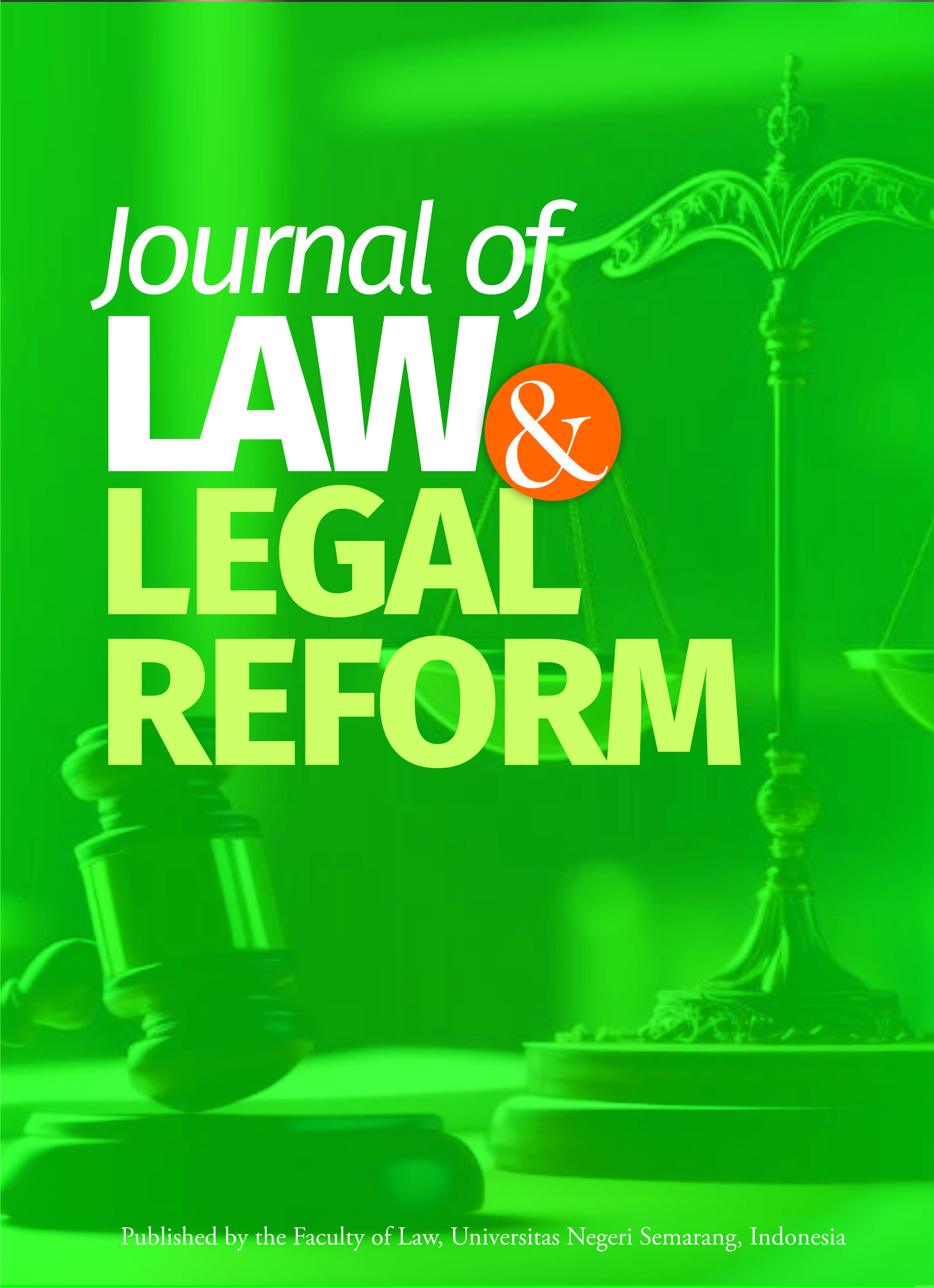Legal Reform against the Conflict of Norms in The Corruption Eradication Commission Law
Main Article Content
Abstract
This research aims to address and propose solutions to the issue of conflicting norms within Indonesian Anti-Corruption Act (Act 19/2019). It is a normative study conducted through a statutory and conceptual approach. Primary and secondary legal materials were collected and analyzed prescriptively. The study suggests resolving the conflict between Article 69D and Article 70B-70C by applying the principle of Lex Posterior Derogat Legi Priori. As a result of this conflict, there are ongoing corruption cases that must now follow the legal process outlined in Act 19/2019, even if the alleged offenses took place prior to its enactment. This situation creates a loophole for objections to the legal process, raising concerns regarding justice, benefits, and legal certainty. Consequently, legal reforms are necessary to address these concerns and improve Act 19/2019. Based on these findings, this research asserts that regulations pertaining to corruption eradication should ensure the integrity of the rules by eliminating conflicts of norms and conflicts of interest. In cases where the process of updating regulations faces challenges, the government can establish derivative regulations or implement conflicting norms to achieve the legal objectives of justice, certainty, and benefit within Act 19/2019.
Article Details

This work is licensed under a Creative Commons Attribution-NonCommercial-ShareAlike 4.0 International License.
All writings published in this journal are personal views of the authors and do not represent the views of this journal and the author's affiliated institutions. Author(s) retain copyrights under a Creative Commons Attribution-NonCommercial-ShareAlike 4.0 International (CC BY-NC-SA 4.0).
References
Atmojo, Tomy Tri, and Pudji Astuti. “Inkonsistensi Norma Pengaturan Independensi Penyidik Polri Pada Komisi Pemberantasan Korupsi.” Novum : Jurnal Hukum 10, No. 1 (2022): 1–10. https://doi.org/https://doi.org/10.2674/novum.v0i0.45272
Baseri, Bahran. “Penetapan Tersangka Menurut Hukum Acara Pidana Dalam Perspektif Hak Asasi Manusia.” Syariah Jurnal Hukum Dan Pemikiran 17, No. 2 (February 1, 2018): 220–239. https://doi.org/10.18592/sy.v17i2.1972
Chassagnard, Sandrine. “Conflict of Norms and Conflict of Values in Law.” In Past and Present Interactions in Legal Reasoning and Logic, edited by Shahid Rahman, 7th ed., 235. (London: Springer International Publishing Switzerland, 2015). https://doi.org/10.1007/978-3-319-16021-4_11
Danil, Elwi, and Iwan Kurniawan. “Optimizing Confiscation of Assets in Accelerating the Eradication of Corruption.” Hasanuddin Law Review 3, No. 1 (March 30, 2017): 67–76. https://doi.org/10.20956/halrev.v3i1.717
Dworkin, Ronald M. “The Model of Rules.” The University of Chicago Law Review 35, No. 1 (1967): 14–46. https://doi.org/10.2307/1598947
Dzikriyah, Wajihatut, and I Ketut Suardita. “Tinjauan Yuridis Terhadap Pembatalan Status Tersangka Dalam Putusan Praperadilan.” Kertha Wicara : Journal Ilmu Hukum 4, No. 3 (2015): 1–5. https://ojs.unud.ac.id/index.php/kerthawicara/article/view/15366
Gottschalk, Petter. “Convenience in White-Collar Crime: A Case Study of Corruption among Friends in Norway.” Criminal Justice Studies 33, No. 4 (October 1, 2020): 413–24. https://doi.org/10.1080/1478601X.2020.1723084
Halpérin, Jean-Louis. “Lex Posterior Derogat Priori, Lex Specialis Derogat Generali Jalons Pour Une Histoire Des Conflits de Normes Centrée Sur Ces Deux Solutions Concurrentes.” The Legal History Review 80, No. 3–4 (2012): 353–397. https://doi.org/10.1163/15718190-000A1212
Hutchinson, Terry, and Nigel Duncan. “Defining and Describing What We Do: Doctrinal Legal Research.” Deakin Law Review 17, No. 1 (October 1, 2012): 83–119. https://doi.org/10.21153/dlr2012vol17no1art70
Irfani, Nurfaqih. “Asas Lex Superior, Lex Specialis, dan Lex Pesterior: Pemaknaan, Problematika, dan Penggunaannya dalam Penalaran dan Argumentasi Hukum.” Jurnal Legislasi Indonesia 17, No. 3 (September 29, 2020): 305–325. https://doi.org/10.54629/jli.v17i3.711
Joseph, Corina, Juniati Gunawan, Yussri Sawani, Mariam Rahmat, Josephine Avelind Noyem, and Faizah Darus. “A Comparative Study of Anti-Corruption Practice Disclosure among Malaysian and Indonesian Corporate Social Responsibility (CSR) Best Practice Companies.” Journal of Cleaner Production 112, No. 4 (January 2016): 2896–2906. https://doi.org/10.1016/j.jclepro.2015.10.091
Kuris, Gabriel. “Watchdogs or Guard Dogs: Do Anti-Corruption Agencies Need Strong Teeth?” Policy and Society 34, No. 2 (June 1, 2015): 125–135. https://doi.org/10.1016/j.polsoc.2015.04.003
Marzuki, Peter Mahmud. Penelitian Hukum. (Jakarta: Kencana, 2016).
Maulana, Afi Ikhsan. “Akibat Hukum Terhadap Barang Bukti Yang Hilang Sebelum Diajukan Sebagai Alat Bukti Dalam Proses Perkara Pidana Dipersidangan.” Dinamika: Jurnal Ilmiah Ilmu Hukum 26, No. 6 (2020): 704–713.
MYS. “Mau Tahu Biaya Penanganan Perkara Korupsi? Simak Angka Dan Masalahnya.” Hukum Online, 2016. https://www.hukumonline.com/berita/a/mau-tahu-biaya-penanganan-perkara-korupsi-simak-angka-dan-masalahnya-lt5733f0ea01aea.
Pahlevi, Reza. “Batas Waktu Penetapan SP3 (Surat Perintah Penghentian Penyidikan) Terkait Kewenangan Kepolisian Pada Perkara Tindak Pidana Korupsi.” Novum : Jurnal Hukum 8, No. 3 (2021): 1–19. https://doi.org/https://doi.org/10.2674/novum.v0i0.37910
Pandapotan, Heber Anggara. “Praperadilan Status Tersangka, Bukti Rusaknya Integrated Criminal Justice System Di Indonesia.” BPKP, 2020.
Puspito, Beni, and Ali Masyhar. “Dynamics of Legality Principles in Indonesian National Criminal Law Reform.” Journal of Law and Legal Reform 4, No. 1 (January 22, 2023): 129–148. https://doi.org/10.15294/jllr.v4i1.64078
Sudarsono, Isitslam, Moh Fadli, and Agustien Cherly Wereh. “Legal Dualism Norm Administrative Decision.” Journal of Law, Policy and Globalization 60 (2017): 130–134.
Sudrajad, Bagoes. “Konflik Kewenangan Antara Polri Dan Kpk Dalam Penyidikan Kasus Korupsi Simulator SIM Ditinjau Dari Prinsip Berlakunya Peraturan Perundang-Undangan.” Thesis (Malang: Universitas Muhammadiyah Malang, 2013).
Suswantoro, Suswantoro, Slamet Suhartono, and Fajar Sugianto. “Perlindungan Hukum Bagi Tersangka Dalam Batas Waktu Penyidikan Tindak Pidana Umum Menurut Hak Asasi Manusia.” Jurnal Hukum Magnum Opus 1, No. 1 (August 1, 2018): 43–52. https://doi.org/10.30996/jhmo.v0i0.1768
Tankebe, J. “Public Confidence in the Police: Testing the Effects of Public Experiences of Police Corruption in Ghana.” British Journal of Criminology 50, No. 2 (March 1, 2010): 296–319. https://doi.org/10.1093/bjc/azq001
Telaumbanua, Dalinama. “Reskritif Status Dewan Pengawas KPK.” Jurnal Education And Development 8, No. 1 (2020): 258–261. https://journal.ipts.ac.id/index.php/ed/article/view/1545
Wendi, and Firman Wijaya. “Penerapan Asas Lex Posteriori Derogat Legi Priori Terhadap Anak Korban Pencabulan (Studi Kasus Pengadilan Negeri Jakarta Utara Nomor 195/Pid.Sus/2015/PN.Jkt.Utr).” Jurnal Hukum Adigama 1, No. 1 (July 20, 2018): 1–27. https://doi.org/10.24912/adigama.v1i1.2172
Zaeni, Ahmad. “Asas Lex Posteriori Derogat Legi Priori Dalam Penemuan Hukum (Rechtsvinding) Oleh Hakim: Studi Atas Pasal 20 A.B. Dan Pasal 4 (1) UU No. 48 Tahun 2009 Tentang Kekuasaan Kehakiman.” Thesis (Malang: Universitas Islam Negeri Maulana Malik Ibrahim Malang, 2012).
Zyglidopoulos, Stelios. “Toward a Theory of Second-Order Corruption.” Journal of Management Inquiry 25, No. 1 (January 23, 2016): 3–10. https://doi.org/10.1177/1056492615579914
